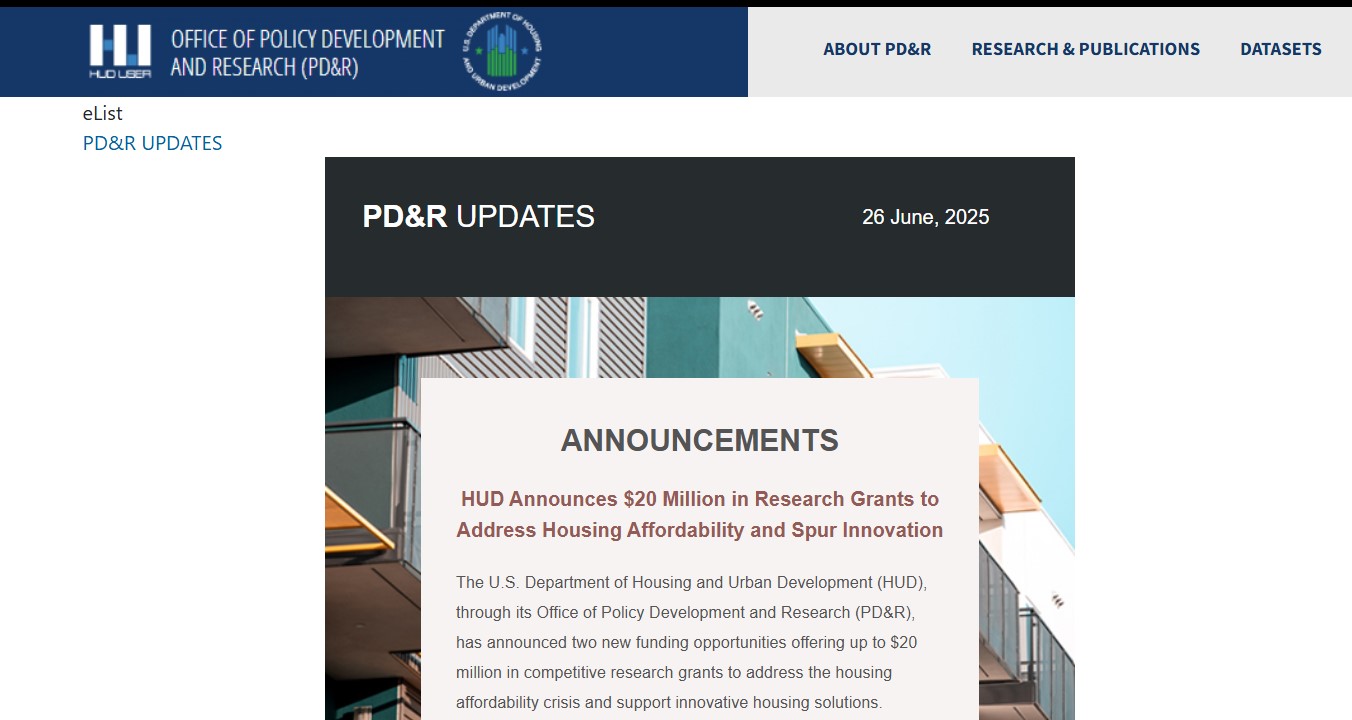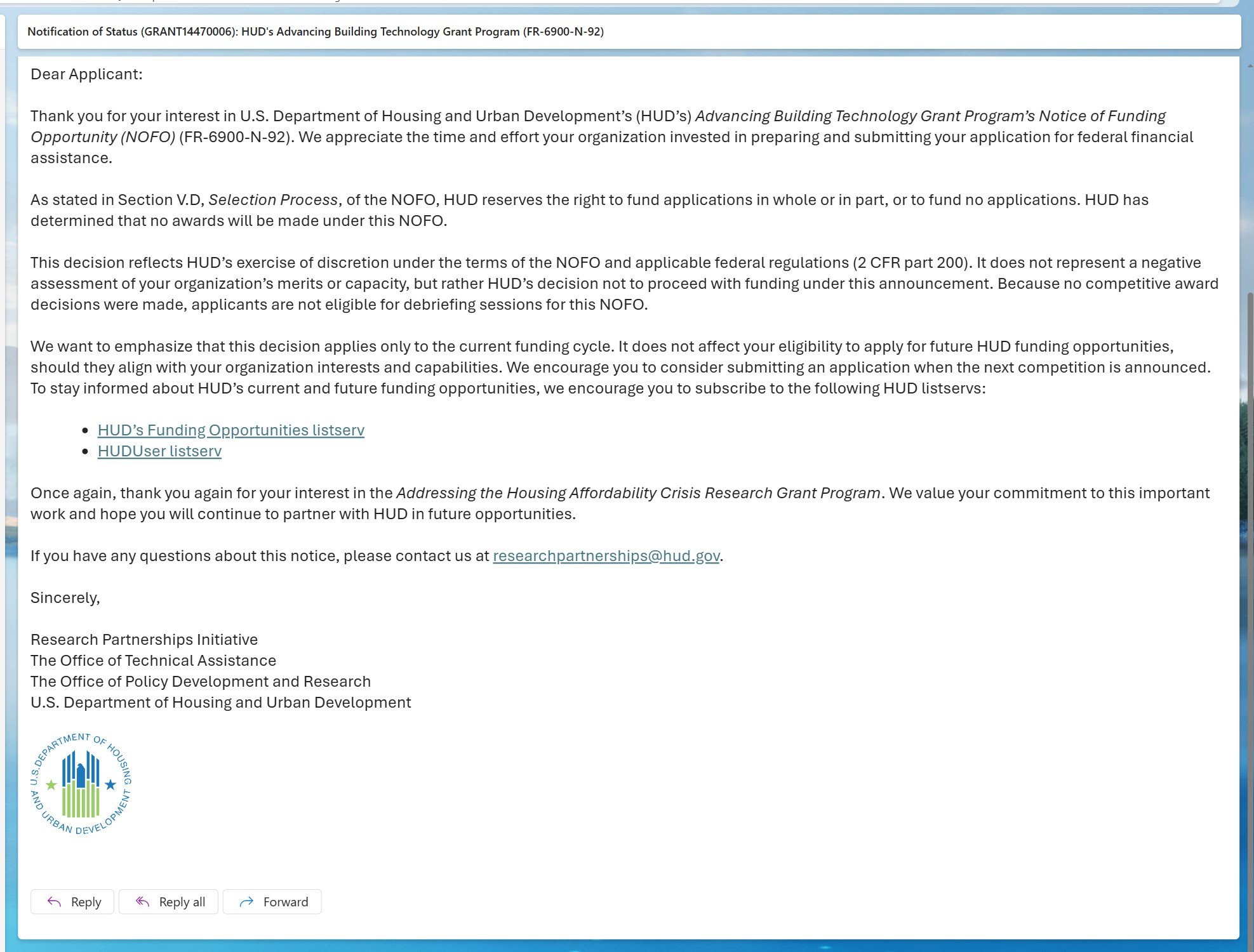Build Ahead
Why We Wrote Three Grants in Three Weeks
In late June 2025, the U.S. Department of Housing and Urban Development (HUD) announced an extraordinary opportunity: $20 million in grant funding for research focused on housing affordability and innovation. The notice came on June 25th. Applications were due less than a month later, on July 24th.
In most corners of higher education, a four-week turnaround for a major federal grant is an impossibility. At many institutions, it takes that long just to align internal approvals and coordinate with sponsored programs. For most academic centers, this was not a window—it was a wall.
At the Center for Offsite Construction, we saw something else: a strategic inflection point.
Over the past two years, our team has developed a clear internal research roadmap—a portfolio of targeted, applied-research initiatives designed to help the U.S. modular and offsite industry transition from one-off, engineered-to-order projects into repeatable, configure-to-order systems. This roadmap includes about a dozen projects focused on contracts, interface standards, scope definitions, supply chain coordination, and legal infrastructure. These aren’t abstract concepts; they’re real-world tools that builders, regulators, manufacturers, and lenders have already told us they need.
Several of these projects have already advanced with little or no external funding. Some are already bearing fruit. But to scale their impact—to accelerate adoption and amplify value—we knew the final stages would require real investment.
When HUD released its notification of funding opportunity (NOFO), it became clear that three of our top-priority projects fit the eligibility criteria precisely:
- The Modular Interface Standard (Phases 3–6)
- A Legal Infrastructure Toolkit for Modular Contracting
- An Accreditation Framework and Degree Program for Offsite Construction
Each proposal stands on its own. Each solves a critical bottleneck for the industry. But taken together, they represent a coordinated push to move the field toward faster, more reliable, more repeatable housing delivery.
We also knew the decision came at a cost. In the weeks following the NOFO, we paused outreach to philanthropic funders. We slowed our roadmap on Modular 2.0. We even delayed the Senior Research Fellows retreat. And most importantly, we made a choice: we would not submit just one proposal. We would submit three.
That decision came during an internal leadership meeting on July 3rd. It didn’t take long. Within five minutes, the question was on the table: could we do this in under three weeks? The answer, unanimously, was “yes.”
We also recognized the broader context. While parts of the federal government are tightening their investments in basic research, HUD’s NOFO represented a rare opportunity for a new type of research center to step forward. The rest of the New York Tech community is navigating reductions in NIH and NSF funding. At CfOC, we saw the chance to demonstrate what a young, agile, and strategically grounded center can do when it aligns technical expertise with national urgency.
That urgency has only intensified. The recent closure of another major modular firm, Assembly OSM (Katerra, Veev, and ConnectHomes), is another clear signal that the industry lacks the scaffolding it needs to succeed. The U.S. construction industry is not yet equipped with the tools, standards, and legal frameworks required to deliver high-quality housing at speed and at scale. We believe our proposals speak directly to that gap.
This moment called for action. Not incrementalism. Not abstraction. Our decision to submit three proposals in three weeks is not a mark of overreach—it’s a reflection of preparedness. We weren’t scrambling. We were ready.
And to our partners: we hope you see this for what it is. Not just a flurry of grant writing, but a serious institutional pivot to a national call. We are building the tools. We are investing the time. And we are ready to deliver.
UPDATE: September 16, 2023 at 9:25AM ET.
Quixotically, this morning HUD sent a blast email that they would not be funding anything related to this Notice of Funding Opportunity. Full message pasted below.

More Posts
All PostsFeb 16, 2026
What's Critically Missing in the Road to Housing Act
Feb 16, 2026
The CfOC's Lessons from Advancing PreFab 2026
Feb 01, 2026

